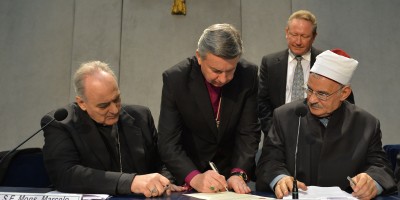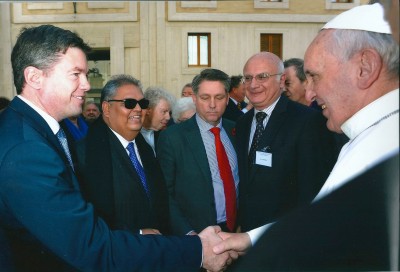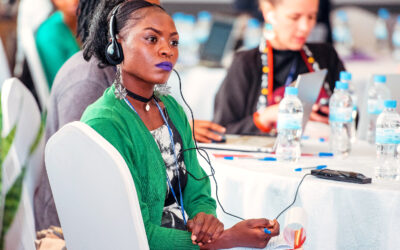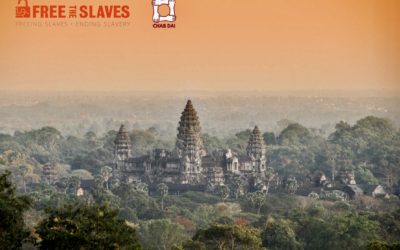If the battle against slavery hasn’t reached your faith community yet, it may be coming soon. A major global faith initiative to end modern-day slavery is taking root. Leading religious representatives and the Walk Free Foundation signed a groundbreaking agreement last month at the Vatican to work together, establishing the Global Freedom Network. The network will have a reach of more than 2.6 billion people – over a third of the world’s population.

Global Freedom Network agreement is signed at the Vatican in March by Catholic, Anglican and Sunni Muslim representatives. Photo: Walk Free.
Some of the key initiatives for the network’s first year include:
- All global faiths slavery-proof their own supply chains and investments and take remedial action where needed, and mobilze their youth sections to support plans to eradicate modern slavery;
- The G20 focuses on modern slavery and human trafficking and adopts an anti-slavery and human trafficking initiative; plus supports the establishment of a global fund to end modern slavery;
- Political leaders slavery-proof government supply chains;
- 50 major multinational businesses whose CEOs are people of faith to commit to slavery-proof their supply chains;
- Families, schools, universities, congregations and institutions are educated on what modern slavery is, how to report it, and the destructiveness of harmful social attitudes, prejudices and social systems in relation to slavery.

Nick Grono meets Pope Francis.
Free the Slaves asked Nick Grono, the former CEO of Walk Free and current CEO of the Freedom Fund, about the importance of mobilizing people of faith.
How was your experience with the pope? Does it make you hopeful or energized?
I participated in a convening at the Vatican to address the issue of modern slavery, as a representative of Walk Free. The convening had been called because the pope had made clear from the beginning of his appointment that fighting modern slavery was a priority for him and the Catholic Church. That is hugely encouraging because the church has a tremendously important role to play. What is particularly exciting is that the Catholic Church is coming together with the Anglican Church and other faith leaders to encourage the world’s major faiths to prioritize the fight against slavery. It will provide a real opportunity to make big progress in this critically important cause.
Why is it important to engage religious leadership as well as reaching out to congregations?
If the pope says that ending slavery is a priority for him and the Catholic Church then it is much easier to get Catholic congregations actively engaged on this. A lot of good work is being done by congregations all around the world, but when there is demonstrable leadership from the very top of the church, it gives much greater impetus to the effort.
How do statements from religious leaders translate into freedom for people who are enslaved?
In various ways. One way is to raise awareness generally; many people in the U.S. or around the world are still unaware that modern slavery exists. So prioritizing it amongst faith leaders certainly raises awareness. The other thing is that churches have significant resources (institutional and financial), and efforts by church institutions on slavery can be tremendously impactful. When Caritas [the development federation of Catholic churches] adopts the fight against slavery as an important priority in its programming, it brings massive resources to bear on the issue. Likewise, the Anglican Communion has started to prioritize efforts against slavery. So now you have support networks with the ability to provide a full range of interventions that can directly assist in the fight against slavery and trafficking.
Religious leaders were crucial in building the global consensus more than a century ago that slavery is immoral and inhumane. But the job now is actually eradicating slavery. Is eradication harder than abolition?
Absolutely. A declaration of abolition is the beginning of a process. Raising awareness is key, but raising awareness on its own does not bring people out of slavery. It facilitates and creates an environment that is much more amenable to those efforts. Having faith leaders is one very important part, and having world leaders and heads of state is certainly an important part, but it is not the end of the problem. Having people engaged on the community level is critically important. Congregations play a leading role here by helping mobilize and support people at the grassroots level. A proclamation is a wonderful development and moves us closer to the goal of ending modern slavery.
April is a deeply religious period of the calendar for many faiths. Are there particular steps that you would like to encourage individuals to take based on their faith?
The most important step is for people to learn and understand what the problem is, and what role they can play in ending modern slavery. Free the Slaves is a tremendously important resource for this. You have resources that explain what individuals can do. So my hope is that this commitment by faith leaders and Walk Free will encourage individuals to learn more, and then encourage people to take small steps. Lots of small steps taken by lots of people add up to significant progress over time. People can become aware of how their purchasing decisions impact modern slavery. People can become aware of their role in impacting the legislative agenda. There are lots of small things that people can do that collectively make a big difference over time
Regarding Walk Free, how does it get this initiative rolling?
Andrew Forrest, founder of Walk Free, attended a meeting in the Vatican last year where he became aware of the Catholic Church’s commitment to fighting slavery. He then worked to build and strengthen the involvement of other faith leaders in this effort. And so it is not just the faiths, but committed civil society leadership which is key to the success of this initiative.
See video of Andrew Forrest on the new initiative here.
Last week, Pope Francis met with sex trafficking survivors at the Vatican and declared that slavery is a “crime against humanity.” See news coverage here and here.
To learn more about modern-day slavery and what you can do to help combat this global injustice, visit Free the Slaves and download the Trafficking Fact Sheet or Action Steps to End Slavery. If you are a member of a faith community, please visit Free the Slaves Faith in Action to see what your community can do to fight slavery!


